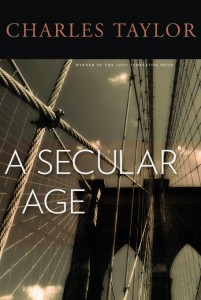
If you’ve missed the discussions surrounding Charles Taylor’s A Secular Age, then you’ve been living an intellectual rock. Taylor is only the most widely discussed philosopher of the last 20 years or so.
His wider influence in the world of philosophy coincided with him coming out… coming out as a Catholic. He did this after he wrote the groundbreaking Sources of the Self: The Making of Modern Identity.
The basic premise of the story he tells in Sources of the Self and all subsequent books (especially A Secular Age) is that the emergence of the positive aspects of modernity is not something that magically came about when we jettisoned religious belief (what he calls the “subtraction theory”). Taylor instead painstakingly goes into the roots of the positive aspects of modernity in, get this, theology and ecclesial developments. It’s an argument that makes both believers and unbelievers uncomfortable.

He has a shorter, openly Catholic version, of this account in a series of lectures entitled A Catholic Modernity? The gist of it is that Taylor thinks all the things we usually attribute to the Renaissance, Reformation, or the Enlightenment, things such as increasingly autonomous and responsible self, can be traced to reforms around the 13th century. Some of these reforms were: clerics pressing the laity to frequently participate in confession, to receive Eucharist at least once a year, improving basic theological training, and so on.
(I should parenthetically add that an essay by Charles Taylor [in conversation with the work of Polish philosopher Jozef Tischner], on the clash between the values of capitalism and democracy, can be found online in my own translation. The English original was lost and I had the task of resurrecting it back into English. Taylor approved the translation. It’s entitled “Several Reflections on the Theme of Solidarity.”)
While articulating this long historical argument it looks like Taylor has also kept the present and the future in mind. He will be delivering the Firth Lectures at the University of Nottingham, home of the Centre of Theology and Philosophy, on the following topic (after the accolades):
“Charles Taylor is Emeritus Professor of Philosophy at McGill University in Canada and formerly Chichele Professor of Social and Political Theory at Oxford and a Fellow of All Souls College. He received the Templeton Prize in 2007. The Templeton Prize was established in 1972 as the world’s largest annual award given to an individual at that time. It is intended to recognize exemplary achievement in work related to life’s spiritual dimension. This distinction was followed in November 2008 by him becoming the first Canadian to win Japan’s Kyoto Prize for arts and philosophy.
Professor Taylor is also a member of the Order of Canada and a foreign honorary member of the American Academy of Arts and Sciences. He was made honorary Doctor of Letters in the University of Oxford in 2012.
His lectures will be an attempt to assess where the philosophical and theological view of human beings stand today in relation to western secular civilisation.”
I suspect the video of the lectures will appear somewhere here on this site.
In the meantime, it appears that the Firth lectures that went into Terry Eagleton’s latest book Culture and the Death of God (where he covers some of the same ground as Taylor, but with more dirty jokes) can be viewed online here:
And here:











